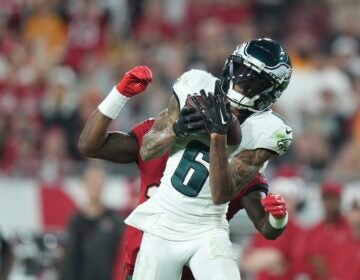Circus feats propel Plymouth Meeting fourth-graders toward life lessons
“It’s really hard because you go a little bit, then you fall,” says Clare Robinson, 9. “It’s really sad because you keep on falling.”
Clare, a fourth-grader at Plymouth Meeting Friends School, has been learning to ride a unicycle since last summer. She now can confidently ride a 5-foot unicycle — about as tall as she is — around the perimeter of the school gymnasium.
But to be a better unicyclist, she had to put it down for a while.
“My problem was I kept on thinking about it — like really kept on thinking about unicycling,” said Claire. “Then what I tried to do was keep my mind off of unicycling. So it helped me not focus on it, to go further.”
That’s the kind of life lesson Clare and her classmates have been learning while training for the circus. This week, for the 10th year running, the fourth-grade class of Plymouth Meeting Friends will stage a fully produced circus: sets, costumes, storyline, juggling, aerial acrobatics, feats of coordination and balance, and clowning.
“I transferred to this school in second grade, so I found out in second grade,” said Anabelle Coplan, 9, a wire walker, aerialist, gymnast, unicyclist, and a pretty good piano player. “I was, like, God! Make me two years older! Please!”
Math joins the circus
The circus program started with Will Starr, a teacher looking for a better way to teach math. He started writing a textbook for fourth-graders and needed a gimmick. “Most math books written for this age are quite boring, to be blunt.”
He devised math problems dressed up as circus scenarios to make the subject more interesting. The next step was to get the kids to act out those math problems.
“For example, when we hang the trapeze at the beginning of the year, a trapeze needs to be hung at 90 degrees to be safe,” said Starr. “So we actually get a protractor to measure the angles of the wire of the ropes and of the trapeze bar to make sure it is accurate and secure.”
Math got them into the circus, but you can’t compute your way onto a unicycle. Clare and her classmate Haven Arms are both accomplished riders, and they have worked up a trick. They face each other with linked arms and ride, Haven pedalling forward and Clare going backward.
“It’s hard because she really has to rely on me to keep my hand steady,” said Haven. “That’s her source of balance.”
“When I’m going backwards,” said Clare.
“Yeah.”
Teamwork also takes a starring role
This trick does not have much to do with math as it does teamwork. The kids are learning to spot each other, support each other, keep an eye out for dangers, and pay attention to each other without adult guidance.
“We are not on stage during the show,” said Starr. “I would like to say we hang out in the audience eating popcorn, but we’re not doing that either. The kids do all the costume changes. The kids do all the scenery changes. It’s really their performance.”
Starr has to bring all the kids up to performance level by Thursday, but not all the kids are at equal level. While R.J. Edmonds, 9, is good at tasks involving coordination — spinning plates on sticks — he is less adept at skills involving balance, such as walking a wire. After two steps, he often falls.
“Well, I’ve been practicing and sometimes I really don’t do that good,” said R.J.
His father has been watching his progress on the unicycle, which R.J. is enthused about.
“He’s not really into athletics or sports,” said Roy Edmonds, who says his son prefers reading and computer games. “The thing I look for is for him to be a self-starter. It’s easy for us to push the kid, but when kids start to push themselves, that’s when they are making great strides.”
Skills extend beyond circus ring
“He has really stepped up taking responsibility — ownership for not only things he is responsible for in the circus but also his classwork and everyday life,” Edmonds said.
A lot of the kids say they will keep up their skills after the performances this week, Realistically, few probably will.
Jennifer Arms’ son went through the program two years ago and no longer does circus tricks. Now her daughter, Haven, is riding a unicycle and juggling.
“It’s not just infectious. It’s addictive,” said Arms, who is competing with her 9-year-old daughter for most consecutive juggles. Haven is beating her mother handily, 265 to 105.
“I watched the kids at the circus last winter and thought, ‘These kids are awesome! It can’t be as hard as it looks. Well, it is hard,” says Arms. “I practiced for a month before I caught on.”
“One World Circus” will be performed Thursday morning (weather permitting), then on Friday and Saturday evenings for the school community.
WHYY is your source for fact-based, in-depth journalism and information. As a nonprofit organization, we rely on financial support from readers like you. Please give today.




